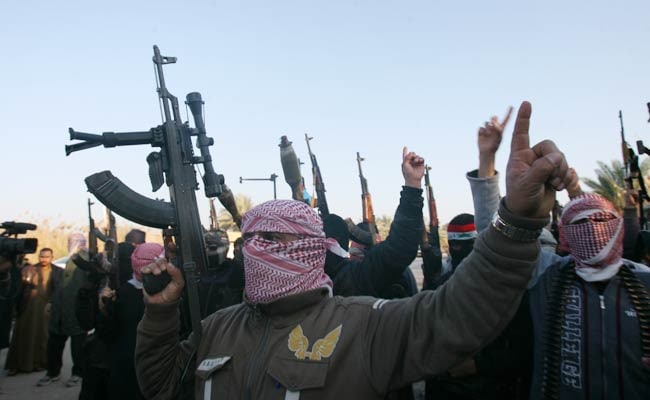
File Photo: Members of the Islamic State militant group. (Associated Press)
Washington:
Iraq's largest refinery in Baiji is not "at risk" despite an offensive by the Islamic State group that has breached parts of the facility, the US military's top general said Thursday.
The IS militants have "penetrated the outer perimeter" of the vast oil refinery and the US-coalition was concentrating bombing raids and surveillance flights over the area, General Martin Dempsey told reporters.
"The refinery itself is at no risk right now, but ... we're focusing a lot of our ISR (intelligence, surveillance and reconnaissance) and air support there," the chairman of the US Joint Chiefs of Staff said.
The US and coalition aircraft had carried out eight air strikes near Baiji on Wednesday and Thursday, according to a statement from the military command overseeing the air campaign.
Iraqi officials acknowledged on Wednesday that the IS group had seized some roads and buildings at the refinery, and that the militants were hiding among fuel tanks, complicating counter-attacks by Iraqi forces.
Asked about an IS assault in the western city of Ramadi, Dempsey said the Baiji refinery carried more strategic importance.
"I would much rather that Ramadi not fall, but it won't be the end of the campaign should it fall," he said.
"We got to get it back. And that's tragic for the people, as we've seen along the way."
Fighting in Ramadi has created a humanitarian problem and prompted a flood of refugees to Baghdad, he said.
Baiji, however, is crucial for the country's oil infrastructure and is the focus of coalition efforts, the general said.
"Once the Iraqis have full control of Baiji, they will control all their oil infrastructure, both north and south, and deny ISIL the ability to generate revenue through oil," said Dempsey, using an alternative acronym for the IS group.
The IS jihadists repeatedly have tried to seize the refinery over the past 10 months but Iraqi security forces have fended off the assaults.
Iraqi troops recaptured the nearby town of Baiji in October but the IS extremists have since taken back the town.
Iraq's Prime Minister Haider al-Abadi -- who has said his government forces would be focusing on taking on IS in western al-Anbar province -- discussed war strategy with US officials during his visit this week.
Dempsey also said the United States was monitoring reports of possible looting or atrocities by some Iraqi militia forces in the battle for Tikrit.
He said so far "there is no evidence of widespread activity" but "there was likely to be some isolated instances," possibly in a village south of the town of Tikrit.
The Iraqi government launched an investigation into what happened during and after the Tikrit offensive, he said.
If a unit was shown to have carried out abuses, the United States would withdraw any support for that particular unit, Dempsey said.
Abadi "declared he was taking responsibility for that investigation," he added.
The IS militants have "penetrated the outer perimeter" of the vast oil refinery and the US-coalition was concentrating bombing raids and surveillance flights over the area, General Martin Dempsey told reporters.
"The refinery itself is at no risk right now, but ... we're focusing a lot of our ISR (intelligence, surveillance and reconnaissance) and air support there," the chairman of the US Joint Chiefs of Staff said.
The US and coalition aircraft had carried out eight air strikes near Baiji on Wednesday and Thursday, according to a statement from the military command overseeing the air campaign.
Iraqi officials acknowledged on Wednesday that the IS group had seized some roads and buildings at the refinery, and that the militants were hiding among fuel tanks, complicating counter-attacks by Iraqi forces.
Asked about an IS assault in the western city of Ramadi, Dempsey said the Baiji refinery carried more strategic importance.
"I would much rather that Ramadi not fall, but it won't be the end of the campaign should it fall," he said.
"We got to get it back. And that's tragic for the people, as we've seen along the way."
Fighting in Ramadi has created a humanitarian problem and prompted a flood of refugees to Baghdad, he said.
Baiji, however, is crucial for the country's oil infrastructure and is the focus of coalition efforts, the general said.
"Once the Iraqis have full control of Baiji, they will control all their oil infrastructure, both north and south, and deny ISIL the ability to generate revenue through oil," said Dempsey, using an alternative acronym for the IS group.
The IS jihadists repeatedly have tried to seize the refinery over the past 10 months but Iraqi security forces have fended off the assaults.
Iraqi troops recaptured the nearby town of Baiji in October but the IS extremists have since taken back the town.
Iraq's Prime Minister Haider al-Abadi -- who has said his government forces would be focusing on taking on IS in western al-Anbar province -- discussed war strategy with US officials during his visit this week.
Dempsey also said the United States was monitoring reports of possible looting or atrocities by some Iraqi militia forces in the battle for Tikrit.
He said so far "there is no evidence of widespread activity" but "there was likely to be some isolated instances," possibly in a village south of the town of Tikrit.
The Iraqi government launched an investigation into what happened during and after the Tikrit offensive, he said.
If a unit was shown to have carried out abuses, the United States would withdraw any support for that particular unit, Dempsey said.
Abadi "declared he was taking responsibility for that investigation," he added.
Track Latest News Live on NDTV.com and get news updates from India and around the world

